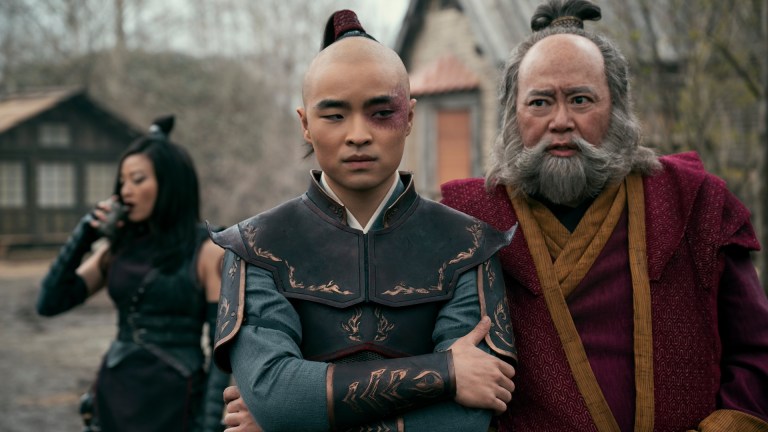A neglected element of the original Avatar series was given new meaning in the Netflix adaptation.

Any adaptation of a piece of art, especially if it’s beloved, is going to need to make changes. Netflix’s Avatar: The Last Airbender was no exception, especially with it adapting 20 episodes of an animated series to eight hour-long episodes of live-action. Cuts would need to be made, story beats switched around, character motivations altered, and a team of creators fresh to the franchise would put their spin on the material.
Some of these changes were fascinating. The remixing of the story with original episodes placed within the stories of other episodes took serious skill to pull off. Other changes just didn’t work. Koh the Face Stealer, originally an evil power so great he could never be defeated, was over-explained to the point that he lost much of his menace. The lack of Zuko (Dallas Liu) directly attacking Kyoshi Island robbed him of important development.
Yet the one change that stood above all the rest, for all the right reasons, involved Zuko and his crew. The 41st Division. In the original season 1 episode 12 “The Storm,” Iroh reveals Zuko’s backstory to the crew of his ship. In a flashback we see the event that caused the prince to be banished, when he spoke out of turn at a meeting of Fire Nation generals. A key part of a plan being laid out was that the Fire Nation would gain the upper hand in a battle against the Earth Nation by utilizing a distraction. A distraction made up of new recruits, the 41st Division. They’re not meant to have a fighting chance, as the General explains,
“What better to use as bait than fresh meat?”
Zuko’s outraged at the idea of sacrificing an entire division this way. He implores, “Those soldiers love and defend our nation. How can you betray them?”
This doesn’t go over well and Zuko faces dire consequences at the hand of his father, Fire Lord Ozai. To him, Zuko challenging a general in his army was an act of complete disrespect. Zuko was forced into an Agni Kai, a fire duel, but he wouldn’t be fighting the insulted general. He had to fight his father, who punished him with his scar and banishment.
While earlier in the episode the crew had been openly questioning Zuko, after hearing this story they demonstrate a new respect for him. “The Storm” was a key moment in Zuko’s character but the crew of his ship were merely there as people for Iroh to tell the flashback story to. They were never that important and after this we don’t learn much about them.
Netflix’s Avatar: The Last Airbender took this original story and made one crucial change that drastically improved upon it. In season 1 episode 6, “Masks,” the flashback to Zuko questioning the Fire Nation general proceeds much as it did in the original series, though Zuko shows more concern for the 41st Division. Ozai (Daniel Dae Kim) directly backs up his general’s plan, stating that “sacrifice is a part of war.”
Zuko can’t hold back, “it’s a terrible plan. Soldiers are gonna die, and for what? It’s unworthy of a Fire Nation officer.”
This once again causes the Agni Kai between Ozai and Zuko but here we get to see more of the events after that battle. Ozai banishes Zuko, giving him the goal of capturing the Avatar. As an afterthought the Fire Lord practically sneers, “and since you’re so concerned with the 41st Division, take them with you as your crew.”
In the present Iroh (Paul Sun-Hyung Lee) explains to Zuko’s crew that they’re alive, “because of my nephew’s sacrifice.” Zuko’s crew is the 41st Division.
This inspired change breathes life into Zuko’s crew. Where in the original series they were barely notable, here they’re given new relevance. Everyday Zuko’s around them he’s reminded they’re the cause of his banishment. While he saved their lives, were they worth it? How can he reconcile the actions he believed were right with the ever-present resentment and disappointment of his father?
It also gives weight to the newfound dedication Zuko’s crew has toward him. They didn’t just hear Zuko’s tragic backstory and simply think better of him. They learn over the course of this episode that they’re alive because of him. When Zuko returns to the ship after the main events of the episode, the soldiers all show him respect. He’s their prince and they’re ready to do anything for him. Most importantly, they care about him as a person… Unlike his father.
The change lines up with the show’s theme of responsibility, one that’s been brought to the fore across many plot lines in this version of Avatar. Zuko has to take responsibility for his actions and live with the consequences, good and bad. Ozai said that sacrifice was a part of war… And Zuko will never forget the sacrifice he made for the 41st Division.
The change welded two separate pieces of the original’s story, drastically enhancing them both in the process.
All eight episodes of Avatar: The Last Airbender are now streaming on Netflix.





